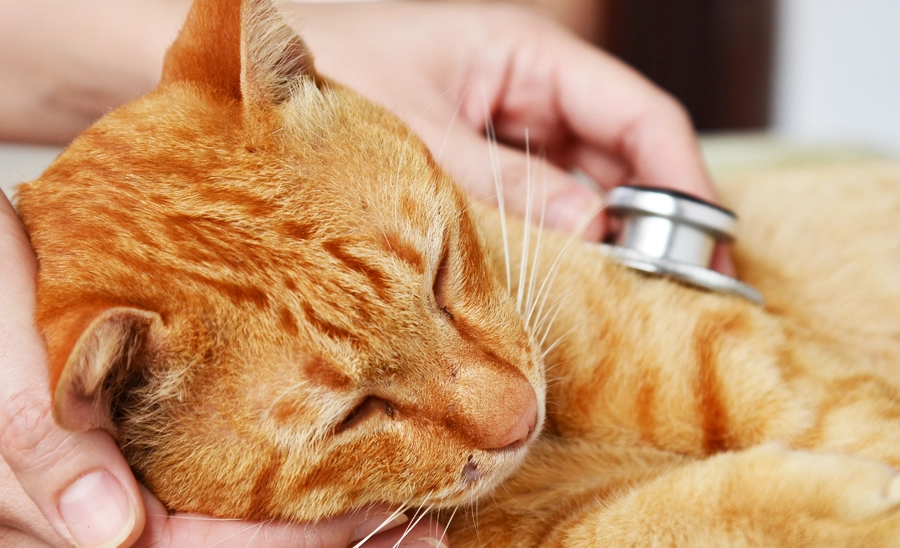
The importance of understanding the changes your pet goes through as they age is crucial as a pet parent.
There are a lot of common health issues that might arise in your pet as they start to enter their golden years. It is imperative that we as pet parents, gain as much helpful information and education to ensure our pets lead the healthiest and happiest lives and it starts the day, we bring them home.
So, when exactly is a cat or dog considered ‘senior’?
Cats are considered ‘senior’ at the age of 7 and for dogs, it depends on their size & breed. Small breeds are considered senior at 10-12 years of age, medium sized dogs at age 8-9 and large sized dogs at the ages of 6-7 years. From a logical standpoint, we would expect a larger breed would live longer than a small breed. It is unclear as to why this is, although some scientists believe that it may have something to do with how humans have bred dogs and in the way they grow.
What do pet parents have to look for?
As they age, we must keep an eye out for their changing needs. We are responsible for their wellbeing and quality of life.
Here are some age-related changes you may notice in your pet:
- Hearing loss – although there can be many reasons for hearing loss, the cause can often be due to degenerative changes found within the nerves of the ear.
- Vision Loss – There can be many reasons that contribute to vision loss such as macular degeneration and glaucoma. Cataracts which cast a white cloudy growth over the lens of the eye and can go hand in hand with other illness such as diabetes. Hypertension which can lead to retinal detachment can cause blindness.
- Smelly breath – Bad dental hygiene & underlying illness such as kidney disease and diabetes can cause dogs to have smelly breath. Over time, tartar will build up on your pet’s teeth and if no oral hygiene regime is in place, they can develop dental disease.
- Lumps & Bumps on the skin may be benign, non-cancerous fatty tumours or possible skin tags or moles. All bumps and lumps that show up on your pet should be checked over by a vet to make sure they are not cancerous.
- Incontinence - Bladder leaks are not an uncommon occurrence in senior pets. This is because the urethral muscles have become weak. Older dogs can often have trouble holding urine in.
- Less energy or sleeping more often – Senior pets will not have as much get up and go as they once did, and often enjoy a more laid back, calmer life which means sleeping more. Regular vet check-ups are recommended to rule out any underlying health concerns.
- Difficulty getting up or walking – Aging dogs can become stiff and not be as flexible as they once were (just like us humans!). But if your pets are clearly showing signs of difficulty walking, getting up after a sleep or lying down, then we recommend a vet check your pet over ASAP to make sure your pet is not in any pain and suffering from arthritis or any other physical health issues.
- Appetite changes – Some older pets can experience appetite changes. Typically, this could be just a decreased interest in eating. Or in some cases, an increase interest in eating more! Aches and pains in senior pets could cause appetite changes because of not feeling well. Some types of illness and the drugs to treat those illnesses can cause nausea and a result of your pet not wanting to eat. Decreased mobility, dental disease, poor oral hygiene, dementia & dehydration can also be a factor in appetite changes.
- Grey hairs around the face – Normal part of the aging process as the pigment cells responsible for colour stop producing, causing lighter strands of hair.
- Behavioural changes – You may notice that your pet has become confused, increased barking and vocalising, waking in the middle of the night and wandering, not coming when called etc. These behaviours could be a result of dementia.
The most common health concerns associated with aging pets are:
- Dental Disease
- Heart Disease
- Kidney and liver issues
- Arthritis
- Cancer
- Dementia
- Hearing & Vision Loss
- Obesity
- Gastrointestinal Issues
Arthritis is very common amongst older dogs. It is a degenerative joint disease. By the time a dog reaches around 8 years old, they have 80% chance of having arthritis!
If you observe any of the following symptoms, it is time to see your vet:
- Lagging on walks & becoming ‘slower’
- Irritability & excessive licking, biting, or chewing of the problem area
- Sleeping more than usual
- Sudden appetite changes
- Not enjoying or engaging in their favourite games and activities
- Limping
- Depression
- Stiffness (trouble getting up from lying position, sitting position to standing
- Becoming reluctant to jump onto the bed, couch, in the car or up stairs as they have easily done any times previously
Diet & Weight Management to prevent Arthritis in pets
It is important that we feed our dogs (from the day you bring them home), a high quality, premium food diet and manage their weight throughout their lives to prevent obesity.
Diet & weight management are important in helping to reduce the risk of and in minimising inflammation and arthritis. Regular weigh ins are helpful to make sure your dog is within the healthy and ideal weight range. Extra weight on your pet at any age puts strain and pressure on your dog’s joints. What may not be painful and sore for a younger overweight dog can eventuate into joint pain if diet and weight are not managed as soon as possible.
If your pet is overweight, consult your vet or talk to the Pet expert in your local Just For Pets store, to put together a plan for your pet to lose weight and provide joint support during their weight loss journey.
Exercise is an important part of any weight loss and arthritis treatment plan. Your vet or Just For Pets Pet Expert, can give you guidance and advice on how much exercise, how often and what types of exercise in the treatment plan. Common exercise recommendations for older pets suffering from obesity, joint pain and arthritis include low impact, light activities such as swimming or short and regular walks 15-30 minutes or start short and increase slowly over time. Walking will help to improve the flexibility of ligaments and tendons and helps to strengthen the muscles.
Swimming is fantastic for pets with arthritis as there is no impact. A heated pool or a purpose-built treatment pool would be ideal. Swimming sessions should always be supervised and structured ensuring easy exits for your dog. Your vet or Pet Expert should help to provide further advice for using swimming as treatment and can refer you to an animal physiotherapist as part of their treatment plan.
Other signs to look for:
Deafness – having trouble hearing commands and their name being called. Can becomes startled more easily due to hearing loss.
Dental Issues: Excessive drooling, bad breath, swollen or inflamed gums, yellow-brownish teeth, pawing at the mouth and refusing to eat are all signs of dental health issues and should consult your vet immediately!
Warts, Lumps & Bumps: These may appear in aging dogs, have these checked over with your vet to make sure it isn’t something serious.
Cognitive & Behaviour Changes: Confusion, trouble recognizing surroundings, excessive barking, waking in the middle of the night, aggression, depression, and disobedience. These are some signs that your pet could have Canine Cognitive Dysfunction or more commonly known as Dementia.
Cloudy Eyes: Hazy film covering the eyes can be normal and not hinder eyesight but are also a sign of cataracts which can lead to blindness. Consult your vet who will check their vision and for cataracts.
Joint Problems: Stiffness, sleeping more often, trouble walking or jumping and walking upstairs can be signs of arthritis and that your pet is in pain. Consult your vet immediately if you notice these signs.
What can you do to help your Senior Pet?
- Proper Medical care: which includes regular check-ups with your vet to rule out any serious health issues and concerns and also keep an eye on any developing symptoms.
- Sticking to a daily routine with structure is important for a pet’s physical and mental wellbeing.
- A healthy and high-quality diet: older pets nutrition needs will change as they age meaning because they become less active and develop a slower metabolism, fewer daily calories are needed to be consumed. Switching to a food that provides some high-quality and easy to digest protein is important to help maintain a healthy body condition.
- Weight check-ups: Keep your dog in a healthy weight range as overweight dogs are prone to diseases such as arthritis, heart problems, diabetes, skin issues, and even cancer. Your vet or Pet Expert can advise you of a healthy diet plan and help choose the best food for your pet.
- Keep on top of dental health: There are many preventive strategies to reduce dental disease, so chat you’re your local Pet Expert about what will work best for you are your dog, but remember to get your dog’s teeth professionally examined and possibly cleaned if there is any sign of gum disease or tartar build up. You can check your dog’s teeth and gum condition on a regular basis.
- Physical accommodations – If your dog has arthritis or joint problems think about acquiring something like a step ladder or ramp to help them get in the car or on the couch or bed more easily. Placing carpet and rugs over hard wooden or tiled floors can help provide comfort too. Shorter walks (around 15 mins) will be easier on your dog’s joint and still provide exercise which help keep them healthy and in shape.
- Mental stimulation: Work your dog’s brain to keep it stimulated and happy! Toys, food puzzles and play are all great ideas in which you can do this. Mental stimulation and enrichment will help keep your older pet occupied.
- Emotional Support: Be understanding and supportive of your aging pet. There are a lot of physical and psychological changes that they will go through while aging. They will need your understanding and support! Having a little more patience is needed for caring for a senior pet and having a loving commitment for your best friend will help them feel as comfortable and happy knowing that you are there to care and love them through their entire life no matter what!
Written by Just For Pets





